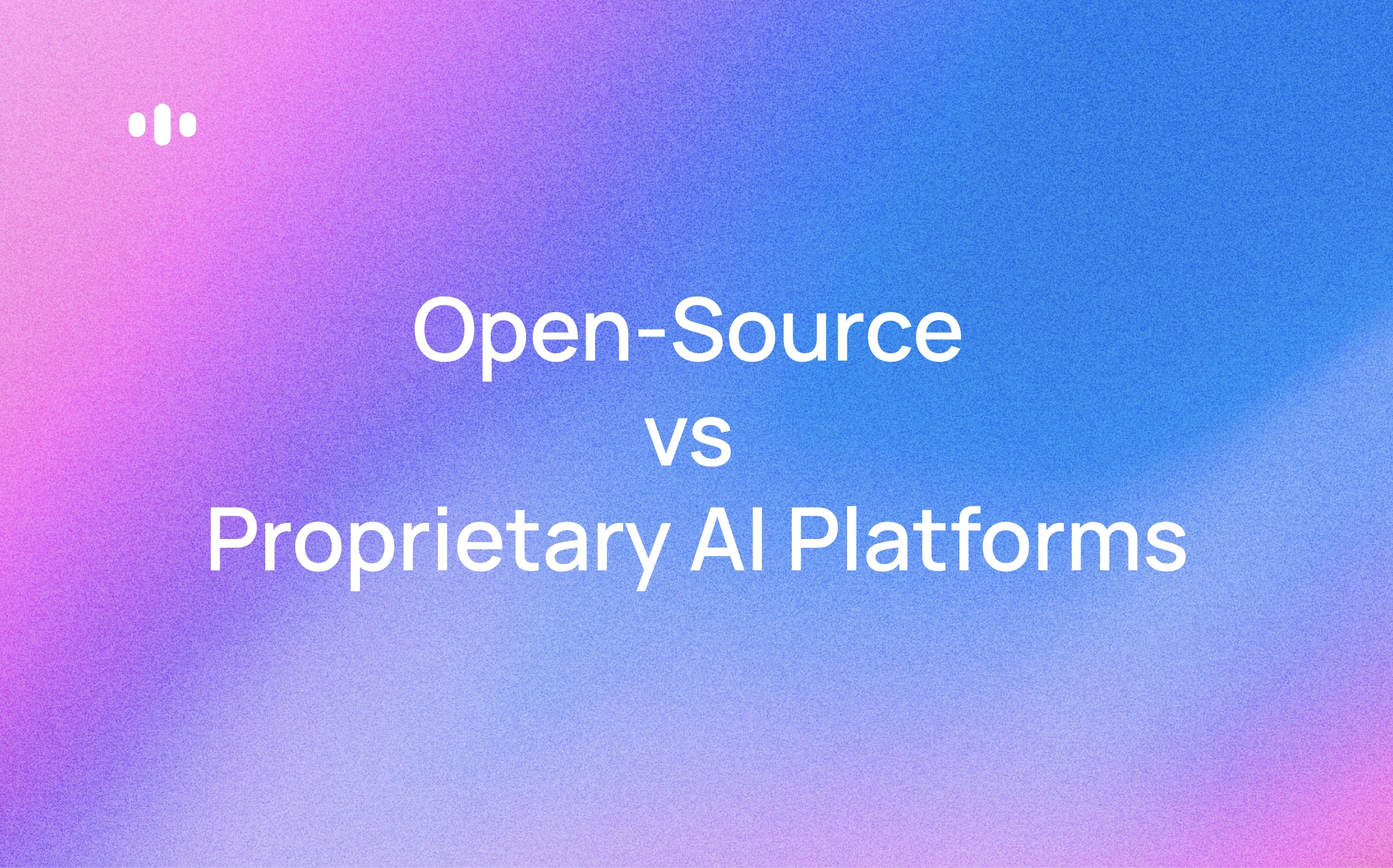Open-Source vs Proprietary Conversational AI Platforms in 2025: Security, Support & TCO


• Open-source vs proprietary: The conversational AI landscape in 2025 presents CTOs with a critical decision between open-source toolkits like SpeechBrain 1.0 and GLM-4.5 versus managed SaaS platforms like Retell AI. (SpeechBrain 1.0)
• AI democratization accelerates: Recent launches like Mistral's Voxtral mark a new frontier in open-source audio models, challenging proprietary voice AI systems by offering deep semantic understanding alongside transcription capabilities. (Mistral Voxtral)
• Cost considerations vary widely: Open-source solutions start at infrastructure costs only, while enterprise SaaS platforms range from free tiers to enterprise pricing, with total cost of ownership extending far beyond licensing fees.
• Production readiness gap: While open-source models show promise in research settings, proprietary platforms like Retell AI are purpose-built to meet the performance, compliance, and scalability demands of enterprise use cases across industries. (Retell AI Platform)
The conversational AI market has reached an inflection point where open-source alternatives are becoming genuinely viable for production workloads. SpeechBrain 1.0 represents a significant milestone as an open-source conversational AI toolkit based on PyTorch that focuses on speech processing tasks including speech recognition, speech enhancement, speaker recognition, and text-to-speech. (SpeechBrain 1.0)
Meanwhile, proprietary platforms have evolved beyond simple chatbots into comprehensive voice AI ecosystems. Retell AI exemplifies this evolution, offering a no-code builder and API that orchestrate real-time speech recognition, LLM-driven dialogue management, multilingual text-to-speech, warm transfers, knowledge-base grounding, and post-call analytics. (Retell AI Features)
The emergence of models like Speech ReaLLM, which combines decoder-only ASR with RNN-T to enable real-time streaming in multi-modal Large Language Models, demonstrates how open-source research is pushing the boundaries of what's possible in conversational AI. (Speech ReaLLM)
PlatformFocus AreaKey StrengthsDeployment ComplexityEnterprise ReadinessSpeechBrain 1.0Speech processing toolkitTransparency, replicability, PyTorch integrationHighResearch-focusedMistral VoxtralAudio model familyDeep semantic understanding, production-readyMediumEarly productionWhisper (Fine-tuned)Speech recognitionClinical applications, customizableMediumDomain-specificSpeech ReaLLMReal-time streamingMulti-modal LLM architectureHighExperimentalSeal ModelFew-shot learningMulti-modal speech and languageHighResearch stage
SpeechBrain promotes transparency and replicability by releasing both pre-trained models and complete 'recipes' of code and algorithms required for training them. (SpeechBrain 1.0) This approach appeals to organizations that need full control over their AI pipeline and want to understand exactly how their models work.
Advantages:
• Complete transparency in model architecture and training processes
• Extensive customization capabilities for specific use cases
• No vendor lock-in or licensing restrictions
• Active research community contributing improvements
Challenges:
• Requires significant ML expertise for implementation and maintenance
• No commercial support or SLA guarantees
• Infrastructure and scaling responsibilities fall entirely on the organization
• Time-to-production can extend months or years
Voxtral represents the first open model capable of deploying truly usable speech intelligence in production environments. Built on Mistral's Small 3.1 LLM backbone, it offers deep semantic understanding alongside transcription capabilities. (Mistral Voxtral)
This development signals a maturation of open-source audio AI, potentially closing the gap between research projects and production-ready solutions that enterprises can deploy with confidence.
The application of Whisper in clinical practice demonstrates how open-source models can be fine-tuned for specific domains. While the baseline Whisper model performs poorly on single-word speech utterances, fine-tuning significantly improves transcription accuracy, reducing Word Error Rate by 87.72% in healthy speech and 71.22% in speech from patients. (Whisper Clinical)
This showcases both the potential and the challenge of open-source solutions: they can achieve excellent results with proper customization, but require domain expertise and significant effort to reach production quality.
Retell AI represents the current state-of-the-art in proprietary conversational AI platforms, designed specifically for enterprise deployment. The platform enables businesses to build, test, deploy, and monitor production-ready phone agents through a comprehensive suite of tools. (Retell AI Platform)
Core capabilities include:
• Drag-and-drop agent builder for non-technical teams
• Real-time speech recognition and LLM-driven dialogue management
• Multilingual support for 31+ languages with automatic detection and switching
• Integration with Twilio, Vonage, SIP trunks, and major CRM systems
• HIPAA and PCI compliance options for regulated industries
Retell AI supports interactions in over 31 languages, including English, Spanish, French, German, Mandarin Chinese, Japanese, Portuguese, Hindi, Russian, Italian, Dutch, Korean, and Swedish. (Multilingual AI) The platform can detect and switch between 10+ languages dynamically, enabling seamless multilingual conversations that enhance customer satisfaction and build stronger relationships.
This level of multilingual sophistication would require significant development effort and ongoing maintenance in an open-source implementation, highlighting the value proposition of managed platforms.
The platform's integration capabilities extend beyond basic API connections. Retell's voice agent can integrate with Salesforce to create new leads, update contact information, or retrieve account data during calls, with connections available through custom API integrations or certified partners. (Salesforce Integration)
Retell has certified partners such as Sidetool, Humanoid AI, and Sidekiq who specialize in building custom AI automations and integrating them into existing tech stacks, providing enterprise customers with implementation support that open-source solutions typically lack.
Advantages:
• Complete visibility into code and data processing
• Ability to audit security implementations independently
• No third-party data sharing concerns
• Full control over security patches and updates
Challenges:
• Responsibility for identifying and patching vulnerabilities
• Need for dedicated security expertise
• Potential for implementation errors in security-critical components
• No vendor accountability for security incidents
Advantages:
• Professional security teams dedicated to platform protection
• Regular security audits and compliance certifications
• Vendor accountability through SLAs and insurance
• Automated security updates and patch management
Challenges:
• Limited visibility into security implementations
• Dependence on vendor security practices
• Potential for vendor data breaches affecting multiple customers
• Less control over security configuration and policies
Retell AI addresses enterprise security concerns by offering HIPAA and PCI compliance options, ensuring that regulated industries can deploy voice AI solutions while meeting their compliance requirements. (Retell AI Platform)
While open-source platforms offer community support through forums, GitHub issues, and documentation, enterprise organizations often find this insufficient for production deployments. The Seal model, which extends auto-regressive language models to multi-modal settings, demonstrates the cutting-edge research happening in open source, but also highlights the gap between research and production support. (Seal Model)
Open-source support characteristics:
• Community-driven assistance with variable response times
• No guaranteed resolution timelines
• Requires internal expertise to interpret and implement solutions
• Limited availability of commercial support options
Retell AI provides comprehensive training and customization support, enabling businesses to enhance customer interactions and streamline operations through their platform. (Training and Customization) This includes human-like interaction capabilities, conversation flow optimization, integration flexibility, and comprehensive monitoring tools.
The platform's customer support experience demonstrates the value of proprietary solutions, with users often unable to distinguish Retell AI from human agents, and conversion rates on par with human agents. (Customer Support)
Direct costs:
• Infrastructure (compute, storage, networking)
• Development team salaries
• DevOps and maintenance personnel
• Security and compliance consulting
Hidden costs:
• Extended development timelines
• Ongoing model training and optimization
• Integration development and maintenance
• Opportunity cost of delayed deployment
Direct costs:
• Platform licensing fees
• Usage-based pricing (API calls, minutes, etc.)
• Integration and customization services
• Training and onboarding
Value factors:
• Faster time-to-market
• Reduced development risk
• Professional support and SLAs
• Automatic updates and improvements
Cost FactorOpen-SourceProprietaryWinnerInitial DevelopmentHigh (6-18 months)Low (days-weeks)ProprietaryOngoing MaintenanceHigh (dedicated team)Low (vendor managed)ProprietaryCustomizationHigh flexibility, high costLimited flexibility, lower costDepends on needsScaling CostsInfrastructure onlyUsage-based pricingDepends on scaleComplianceHigh (internal effort)Included in platformProprietarySupportCommunity/internalProfessional SLAProprietary
Conversational AI applications demand sub-second response times to maintain natural dialogue flow. The development of offline speech recognition capabilities addresses latency concerns by enabling local processing, which is particularly important for security-sensitive applications. (Offline Speech Recognition)
Advantages:
• Optimizable for specific hardware configurations
• No network latency for API calls
• Customizable model architectures for performance
Challenges:
• Requires expertise to optimize effectively
• Infrastructure scaling complexity
• Model loading and initialization overhead
Retell AI's platform is designed for real-time performance with optimized infrastructure and global edge deployment. The platform can be integrated into most support systems within a few days, depending on specific setup and requirements, demonstrating the operational efficiency of managed solutions. (Customer Support)
Achieving compliance with regulations like HIPAA or PCI DSS using open-source platforms requires comprehensive understanding of both the regulatory requirements and the technical implementation details. Organizations must:
• Implement proper data encryption and access controls
• Establish audit trails and monitoring systems
• Maintain documentation of security practices
• Undergo regular compliance assessments
Retell AI offers HIPAA and PCI compliance options, enabling deployment across regulated industries including healthcare, insurance, and financial services. (Retell AI Platform) This compliance readiness significantly reduces the burden on enterprise customers who need to meet regulatory requirements.
The platform is used across healthcare, insurance, financial services, logistics, home services, retail, and travel-hospitality contact centers, demonstrating its ability to meet diverse compliance requirements across industries.
• Deep customization required: Your use case demands significant model modifications or novel architectures
• Data sovereignty critical: Regulatory or security requirements mandate complete data control
• Long-term cost optimization: High-volume usage where infrastructure costs become more economical than SaaS pricing
• Research and development focus: Your organization has ML expertise and wants to contribute to model development
• Unique domain requirements: Standard models don't address your specific industry or language needs
• Fast time-to-market essential: Business requirements demand rapid deployment and iteration
• Limited ML expertise: Your team lacks deep machine learning and infrastructure capabilities
• Compliance requirements: You need certified compliance with industry regulations
• Operational efficiency priority: You want to focus on business logic rather than AI infrastructure
• Proven reliability needed: Mission-critical applications require vendor SLAs and support
Some organizations adopt hybrid strategies, using proprietary platforms for rapid prototyping and production deployment while maintaining open-source research initiatives for long-term competitive advantage. This approach allows teams to benefit from both the speed of managed platforms and the flexibility of open-source development.
Healthcare organizations face unique challenges in conversational AI deployment, including HIPAA compliance, clinical accuracy requirements, and integration with existing EMR systems. The application of Whisper in clinical practice for post-stroke speech assessment demonstrates both the potential and the complexity of deploying AI in healthcare settings. (Whisper Clinical)
Retell AI's HIPAA compliance options and healthcare industry experience make it particularly suitable for medical applications where regulatory compliance is non-negotiable.
Financial institutions require PCI DSS compliance, fraud detection capabilities, and integration with core banking systems. The complexity of these requirements often favors proprietary platforms that can provide certified compliance and professional support.
Contact center applications benefit from Retell AI's comprehensive feature set, including warm transfers, IVR navigation, and post-call analytics. (Retell AI Features) The platform's ability to handle multilingual conversations and integrate with existing CRM systems addresses the core needs of modern contact centers.
The launch of production-ready open-source models like Voxtral signals increasing competition for proprietary platforms. As open-source tools mature, the gap in production readiness continues to narrow, potentially shifting the cost-benefit analysis for many organizations.
Proprietary platforms are responding by focusing on higher-level value-adds: better integrations, industry-specific solutions, and comprehensive support ecosystems. Retell AI's approach of providing not just the AI technology but the complete infrastructure for voice agent deployment exemplifies this strategy.
We're likely to see continued convergence between open-source capabilities and proprietary ease-of-use, with open-source platforms adding more production-ready features and proprietary platforms offering more customization options.
• [ ] Do you have ML engineering expertise in-house?
• [ ] Can you dedicate resources to model training and optimization?
• [ ] Do you have infrastructure for scaling conversational AI workloads?
• [ ] Are your customization requirements beyond standard platform capabilities?
• [ ] What's your target time-to-market?
• [ ] Do you need guaranteed uptime and support SLAs?
• [ ] Are compliance certifications required?
• [ ] What's your total budget including hidden costs?
• [ ] Is conversational AI core to your competitive advantage?
• [ ] Do you want to contribute to open-source development?
• [ ] How important is vendor independence?
• [ ] What are your long-term scaling projections?
The choice between open-source and proprietary conversational AI platforms in 2025 depends heavily on your organization's specific requirements, capabilities, and strategic priorities. Open-source solutions like SpeechBrain 1.0 and Mistral's Voxtral offer unprecedented transparency and customization potential, but require significant expertise and resources to deploy effectively. (SpeechBrain 1.0) (Mistral Voxtral)
Proprietary platforms like Retell AI provide comprehensive, production-ready solutions with professional support, compliance certifications, and rapid deployment capabilities. (Retell AI Platform) For most enterprises, especially those in regulated industries or with limited ML expertise, the total cost of ownership and risk profile favor managed platforms.
The decision ultimately comes down to whether you want to build conversational AI capabilities as a core competency or leverage them as a tool to enhance your primary business objectives. As the technology continues to mature, both approaches will become more viable, giving organizations greater flexibility in their conversational AI strategy.
Regardless of your choice, the key is to start with a clear understanding of your requirements, conduct thorough proof-of-concept testing, and maintain flexibility to adapt as the technology landscape evolves. The conversational AI revolution is just beginning, and the platforms you choose today will shape your customer experience capabilities for years to come.
Open-source platforms like SpeechBrain 1.0 and Mistral's Voxtral offer full control, transparency, and customization but require significant technical expertise and infrastructure investment. Proprietary platforms like Retell AI provide managed services with enterprise support, faster deployment, and built-in integrations, but with less control and ongoing subscription costs. The choice depends on your organization's technical capabilities, security requirements, and long-term strategy.
Voxtral, launched by Mistral in July 2025, represents a breakthrough as the first open model capable of deploying truly usable speech intelligence in production. Built on Mistral's Small 3.1 LLM backbone, it offers deep semantic understanding alongside transcription capabilities. This positions it as a more production-ready alternative to other open-source solutions that may require more extensive customization and fine-tuning.
Open-source platforms provide complete transparency into the codebase, allowing organizations to audit security implementations and ensure compliance with strict data governance requirements. Self-hosting eliminates third-party data sharing concerns and enables air-gapped deployments for sensitive applications. However, organizations must take full responsibility for security patches, updates, and infrastructure hardening.
Retell AI offers enterprise-grade features including human-like interactions, comprehensive monitoring tools, and integration flexibility with platforms like Salesforce. The platform supports over 31 languages and can be integrated into most support systems within days. While this provides faster time-to-market and professional support, it comes with ongoing subscription costs and less control over the underlying infrastructure compared to self-hosted open-source solutions.
TCO analysis should include initial development costs, infrastructure expenses, ongoing maintenance, security compliance, and staff training. Open-source solutions may have lower licensing costs but higher implementation and maintenance expenses. Proprietary platforms have predictable subscription fees but may become expensive at scale. Consider factors like required customization depth, compliance requirements, available technical expertise, and long-term scalability needs.
Performance varies significantly based on implementation and infrastructure. Self-hosted open-source solutions can achieve lower latency when properly optimized and deployed close to users, but require significant engineering effort. Managed platforms like Retell AI optimize for consistent performance across their infrastructure but may have higher baseline latency due to network routing. Recent advances like Speech ReaLLM enable real-time streaming ASR, making performance gaps less significant for well-implemented solutions.
1. https://arxiv.org/abs/2407.00463
2. https://arxiv.org/abs/2407.14875
3. https://arxiv.org/abs/2507.17326
4. https://arxiv.org/html/2406.09569v1
6. https://techxplore.com/news/2024-12-offline-speech-recognition.html
7. https://www.retellai.com/blog/how-to-use-ai-phone-agents-for-multilingual-communication
8. https://www.retellai.com/blog/inside-retell-ai-conversational-ai-phone-system
9. https://www.retellai.com/blog/training-and-customizing-voice-agents-with-retell-ai

Start building smarter conversations today.

